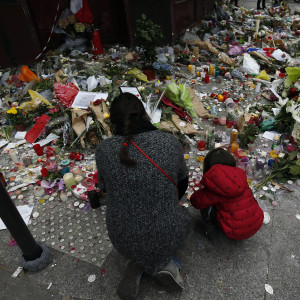Terrorism has been front and center in the last three American presidential elections, and this weekend’s bloodbath in Paris served notice that 2016 will be no exception. In the hours since Friday’s attacks that left more than 120 dead, national security hawks like Republican presidential contender Sen. Lindsey Graham have stepped to the fore, warning the United States is the ultimate target of the Islamic State.
“There is a 9/11 coming, and it is coming from Syria if we don’t disrupt their operations inside of Syria,” the South Carolina Republican said Sunday on CNN. Graham called for an additional 10,000 American troops in the Middle East as part of a multi-national army charged with retaking northern Syria and western Iraq from the terror group known as ISIS or ISIL. “Without American boots on the ground in Syria and Iraq, we’re going to get hit here at home. And if you don’t understand that, you’re not ready to be commander in chief.”
Graham has gotten nowhere in the crowded GOP presidential field by campaigning against President Barack Obama’s handling of ISIS and the Middle East, but the unprecedented, coordinated attack that shook the French capital on Friday had leaders around the world sounding more like the hawkish South Carolina lawmaker.
French President Francois Hollande — who vowed his country’s retribution against ISIS would be “pitiless” — followed up Sunday with “massive” air strikes against Islamic State positions in Syria. And as news broke that one of the terrorists in Paris had gained entry to the European Union by posing as a Syrian refugee, Poland announced it would no longer accept migrants without security guarantees. At the Vatican on Saturday, Pope Francis warned of a “piecemeal” third world war.
At a rally the same day in Texas, Donald Trump who has surged to the top of the Republican field by framing illegal immigration as an existential economic and security threat to the U.S., drew cheers when he called the administration’s plans to welcome thousands of Syrian war refugees to the country “insane.”
Trump’s Twitter ruminations on whether strict Parisian gun-control laws added to the death toll drew a sharp rebuke from the French ambassador to the U.S., who called the billionaire a “vulture.” But conservative commentator Ann Coulter, holding a finger to the prevailing political winds, tweeted Friday to 706,000 followers that “Donald Trump was elected president tonight.”
Other GOP presidential hopefuls, including two of Graham’s Senate colleagues, Ted Cruz of Texas and Marco Rubio of Florida were quick to ramp up their rhetoric on ISIS, though each stopped short of Graham’s call for a large-scale, troops-on-the-ground redeployment in Iraq.
On Facebook, Rubio called the escalating conflict between the West and “radical Islam” a “clash of civilizations — and either they win or we win.” On ABC’s ‘This Week,” the Florida senator said “there will have to be significant American engagement.” Asked about ground troops, he said, “I think it’s premature to say the exact number.”
Cruz, campaigning Saturday in South Carolina, called for a dramatic expansion in the existing bombing campaign against ISIS — even at the risk of increased deaths of Syrian civilians — and criticized President Obama as unwilling to lead a global fight against terror.
“We need a president that makes abundantly clear to any militant across the face of the earth, if you go and join ISIS, if you wage jihad against the United States of America, then you are signing your death warrant,” Cruz said.
“There is a consequence to having an administration, to President Obama, to Hillary Clinton being unwilling to call radical Islamic terrorism by its name,” he added.
But even Clinton struck a decidedly more martial tone during Saturday night’s Democratic Party presidential debate in Des Moines, telling CBS News moderator John Dickerson that ISIS cannot be “contained, it must be defeated” — an indication the former secretary of State isn’t exactly on the same page with her old boss in the White House when it comes to the war on terror.
Obama has been blasted after his use of “contained” to describe ISIS in a Nov. 12 interview — one day before the Paris attacks. White House officials complain the remark has been taken out of context, but with Republicans already using the comment to question, again, the administration’s judgement on national security issues, Clinton clearly felt a need to distance herself from the president.
While her Democratic rivals on the debate stage seemed unwilling Saturday to tackle the ramifications on U.S. security of the Paris attack (Bernie Sanders offered a brief, two-sentence summation in his opening statement before pivoting back to economic issues), the former secretary of State spoke at length, challenging Gulf allies to stand up to jihadists and defending regime change in Libya.
The tough talked seemed to work, at least with the viewers watching the debate: A Public Policy Polling survey showed a whopping 67 percent of those polled thought Clinton won. A similar poll by CBS News had Clinton winning, 51 percent to Sanders’ 28 percent.

